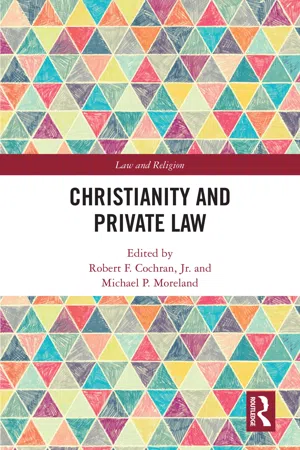
Christianity and Private Law
- 318 pages
- English
- ePUB (mobile friendly)
- Available on iOS & Android
Christianity and Private Law
About this book
This volume examines the relationship between Christian legal theory and the fields of private law.
Recent years have seen a resurgence of interest in private law theory, and this book contributes to that discussion by drawing on the historical, theological, and philosophical resources of the Christian tradition. The book begins with an introduction from the editors that lays out the understanding of "private law" and what distinguishes private law topics from other fields of law. This section includes two survey chapters on natural law and biblical sources. The remaining sections of the book move sequentially through the fields of property, contracts, and torts. Several chapters focus on historical sources and show the ways in which the evolution of legal doctrine in areas of private law has been heavily influenced by Christian thinkers. Other chapters draw out more contemporary and public policy-related implications for private law.
While this book is focused on the relationship of Christianity to private law, it will be of broad interest to those who might not share that faith perspective. In particular, legal historians and philosophers of law will find much of interest in the original scholarship in this volume. The book will be attractive to teachers of law, political science, and theology. It will be of special interest to the many law faculty in property, contracts, and torts, as it provides a set of often overlooked historical and theoretical perspectives on these fields.
Frequently asked questions
- Essential is ideal for learners and professionals who enjoy exploring a wide range of subjects. Access the Essential Library with 800,000+ trusted titles and best-sellers across business, personal growth, and the humanities. Includes unlimited reading time and Standard Read Aloud voice.
- Complete: Perfect for advanced learners and researchers needing full, unrestricted access. Unlock 1.4M+ books across hundreds of subjects, including academic and specialized titles. The Complete Plan also includes advanced features like Premium Read Aloud and Research Assistant.
Please note we cannot support devices running on iOS 13 and Android 7 or earlier. Learn more about using the app.
Information
Part I
Introduction
1 Introduction
What is private law?
Christianity and private law
Table of contents
- Cover
- Half Title
- Series Page
- Title Page
- Copyright Page
- Contents
- Foreword
- Contributing authors
- PART I Introduction
- PART II Property
- PART III Contracts
- PART IV Torts
- Index